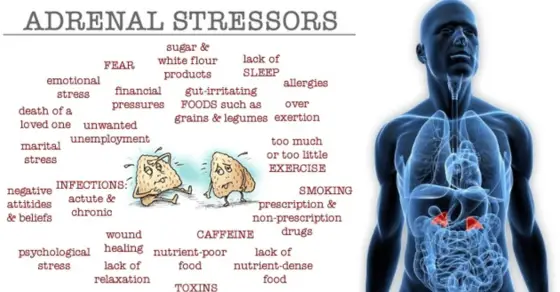Best Foods for Adrenal Gland Health: Nutrient Breakdown and Benefits
Supporting adrenal health through a nutrient-rich diet is essential for managing stress, maintaining balanced energy levels, and promoting overall well-being. The adrenal glands play a critical role in producing hormones like cortisol and adrenaline, which help the body respond to stress. A well-rounded diet with specific nutrients can nourish the adrenal glands and help them function properly, especially in times of physical or emotional stress.
Here is a detailed look at the best foods for adrenal health, along with their key nutrients and the role these nutrients play in supporting adrenal function.
1. Leafy Greens (e.g., Spinach, Chard, Romaine, Sprouts)
Nutrients:
- Magnesium: 157 mg per cup (cooked spinach)
- Vitamin C: 120 mg per cup (raw kale)
- Vitamin K: 112 mcg per cup (cooked kale)
- Folate: 263 mcg per cup (cooked spinach)
Benefits for the Adrenal Glands:
Leafy greens like spinach and romaine are rich in magnesium, a critical mineral for adrenal health. Magnesium helps regulate cortisol levels and reduces the impact of stress on the body. These greens are also a great source of vitamin C, which is heavily utilized by the adrenal glands, especially during times of stress. Folate and vitamin K further support hormone production and help maintain overall energy levels.
2. Citrus Fruits (e.g., Oranges, Lemons, Grapefruits)
Nutrients:
- Vitamin C: 70 mg per medium orange
- Folate: 40 mcg per orange
- Potassium: 237 mg per orange
Benefits for the Adrenal Glands:
Vitamin C is one of the most essential nutrients for adrenal gland function. The adrenal glands have one of the highest concentrations of vitamin C in the body, and they rely on this nutrient for the production of cortisol and other stress hormones. Citrus fruits provide a quick, refreshing source of vitamin C, which helps reduce oxidative stress on the adrenal glands and promotes faster recovery from stressful events.
I take Radiate 21 daily because it contains lime, lemon and orange extract which give me citrus nutrients along with Ashwagandha and Suma, adaptogens for stress. It’s the ultimate formula for converting stress in the body to energy. Learn more at Radiate21.com.
3. Fatty Fish (e.g., Salmon, Mackerel, Sardines)
Nutrients:
- Omega-3 Fatty Acids: 2,000 mg per 3.5 oz (salmon)
- Vitamin D: 570 IU per 3.5 oz (salmon)
- Protein: 25 g per 3.5 oz (salmon)
Benefits for the Adrenal Glands:
Fatty fish are a rich source of omega-3 fatty acids, particularly EPA and DHA, which help lower inflammation in the body and reduce cortisol levels. These healthy fats also support the function of the nervous system, which is closely connected to adrenal health. Additionally, the vitamin D found in fatty fish helps regulate mood and energy levels, contributing to overall adrenal health.
4. Nuts and Seeds (e.g., Almonds, Chia Seeds, Pumpkin Seeds)
Nutrients:
- Magnesium: 76 mg per ounce (almonds)
- Omega-3 Fatty Acids: 5,000 mg per ounce (chia seeds)
- Zinc: 2.9 mg per ounce (pumpkin seeds)
- Protein: 6 g per ounce (almonds)
Benefits for the Adrenal Glands:
Nuts and seeds provide a wealth of nutrients, particularly magnesium, which helps regulate the production of stress hormones. Chia seeds are an excellent source of plant-based omega-3 fatty acids, which reduce inflammation and improve adrenal function. Pumpkin seeds contain zinc, which supports hormone production and helps protect the adrenal glands from oxidative damage. Overall, these small powerhouses of nutrition help support the adrenal glands during periods of stress.
5. Avocados
Nutrients:
- Potassium: 485 mg per half avocado
- Healthy Fats (Monounsaturated): 10 g per half avocado
- Folate: 60 mcg per half avocado
- Vitamin C: 10 mg per half avocado
Benefits for the Adrenal Glands:
Avocados are a rich source of healthy fats and potassium, both of which are critical for adrenal health. The potassium in avocados helps balance electrolyte levels, which can become imbalanced during times of stress. Healthy fats also support hormone production and provide sustained energy, helping to reduce the strain on the adrenal glands. Their anti-inflammatory properties make avocados a top food for adrenal support.
6. Bone Broth
Nutrients:
- Amino Acids (Glycine, Proline): Varies by preparation, but typically abundant
- Collagen: 10 g per cup (on average)
- Calcium: 10-15 mg per cup
Benefits for the Adrenal Glands:
Bone broth is packed with amino acids like glycine and proline, which support tissue repair and hormone balance. The collagen in bone broth helps strengthen the gut lining, which is often compromised during periods of chronic stress. A healthy gut is vital for proper adrenal function, as the gut and adrenals are closely connected through the gut-adrenal axis. Bone broth also helps maintain hydration, supporting adrenal function during times of fatigue.
I get my pasture raised bone broth from Paleovalley. Click here to get 15% off your bone broth order.
7. Eggs
Nutrients:
- B Vitamins (B12, B2, B5): 1.4 mcg of B12 per egg
- Protein: 6 g per egg
- Choline: 147 mg per egg
- Vitamin D: 41 IU per egg
Benefits for the Adrenal Glands:
Eggs are a complete protein, containing all essential amino acids, making them excellent for supporting adrenal health. B vitamins, particularly B5 (pantothenic acid), are crucial for the synthesis of adrenal hormones, including cortisol. Choline helps in the production of acetylcholine, a neurotransmitter that supports the nervous system and adrenal function. Eggs also provide sustained energy, helping to stabilize blood sugar levels and reduce adrenal fatigue. It is important to note that you want to consume only grass-fed, pasture raised eggs.
8. Berries (e.g., Blueberries, Raspberries)
Nutrients:
- Antioxidants (Anthocyanins): 9.7 mmol per 100 g (blueberries)
- Vitamin C: 14 mg per half cup (raspberries)
- Fiber: 4 g per cup (blueberries)
Benefits for the Adrenal Glands:
Berries are packed with antioxidants, particularly anthocyanins, which protect the adrenal glands from oxidative stress. Vitamin C in berries also supports the production of cortisol and helps reduce inflammation. The fiber content in berries helps stabilize blood sugar levels, preventing spikes and crashes that can overwork the adrenal glands. Consuming berries regularly can improve resilience to stress and support adrenal recovery.
9. Herbal Teas (e.g., Licorice Root, Ashwagandha, Holy Basil)
Nutrients:
- Phytonutrients (Saponins, Withanolides, Eugenol): Varies by herb
- Adaptogens: Naturally occurring in these herbs
Benefits for the Adrenal Glands:
Adaptogenic herbs like licorice root, ashwagandha, and holy basil help balance stress hormones and improve adrenal function. Licorice root, for example, helps prolong the effects of cortisol, which can help in managing chronic stress. Ashwagandha and holy basil have calming effects on the body, reducing cortisol levels and supporting the adrenals during stressful times. Herbal teas made from these adaptogens can be a gentle way to support adrenal health.
I highly recommend using Radiate21.com for a blend of adaptogens such as Ashwagandha and Suma, it also contains many antioxidants that help to reduce oxidative stress on the body. You can learn more by visiting Radiate21.com. It also contains lemongrass which is a calming grass that aids in the natural stress response of the body as well. Learn more by watching these videos:
These are just two of the ingredients in the radiate 21 formula. Learn about the other 19 ingredients at Radiate21.com.
11. Sweet Potatoes
Nutrients:
- Beta-Carotene (Vitamin A): 19,218 IU per cup (mashed)
- Potassium: 448 mg per cup (mashed)
- Vitamin C: 22 mg per cup (mashed)
- Fiber: 6 g per cup (mashed)
Benefits for the Adrenal Glands:
Sweet potatoes are a great source of complex carbohydrates, which provide steady energy without causing blood sugar spikes. This helps the adrenal glands maintain stability and function efficiently. Their high potassium content supports electrolyte balance, while the beta-carotene and vitamin C provide antioxidant protection for the adrenal glands. Including sweet potatoes in your diet can help prevent adrenal fatigue by supporting sustained energy production.
By incorporating these nutrient-dense foods into your diet, you can promote healthy adrenal function, manage stress more effectively, and maintain balanced energy levels throughout the day. Avoiding processed foods, excessive caffeine, and refined sugars is also key to preventing adrenal fatigue and ensuring long-term adrenal health.




